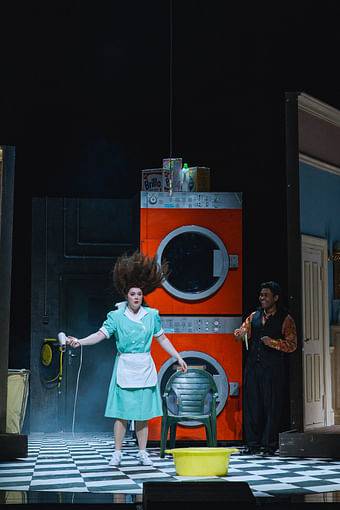A comedy about sex and power
Director Lotte de Beer in conversation about Mozart’s opera, class struggle, sex, power – and four very different perspectives on a musical masterpiece.
Lotte, people often say that Le nozze di Figaro is, above all, about class struggle – that the opera breathes the spirit of the French Revolution.
That reading may be valid. But for me, Le nozze di Figaro is, first and foremost, a comedy about sex and power. The entire musical structure is built around variations of dances that reflect social hierarchy and flirtation.
Sex and power – still an uneasy pairing, wouldn’t you say?
Absolutely. Especially since the rise of the #MeToo movement in 2017, people have begun to reflect more critically on the role these themes have played in recent decades. Our view of sex and power has undergone a fundamental shift. That’s why our production of Le nozze di Figaro explores multiple perspectives – not just one.
How do you achieve that?
By telling each act from a different character’s point of view – also reflected in Rae Smith’s set design and Jorine van Beek’s costumes.
Four perspectives in four acts?
Exactly. In Act I, we see the world through the eyes of the Count: For him, the pursuit of young servants is a cheeky game. An older woman knitting and longing for love is, in his view, pure comic relief; sending a young rival off to war is a clever and amusing way to get rid of competition on the flirting front. Act II shifts to Susanna’s perspective. She’s a working-class woman desperately trying to keep this chaotic household in order. She has to fend off a boundary-crossing boss, manage an over-sexualized teenager, serve a depressed mistress, and deal with a naïve fiancé.
And Act III takes on a much darker tone, correct?
Yes. In Act III, we step into the Countess’s world. She has lost hope. Nihilism has taken hold of her. Even when her husband is openly confronted with his misconduct, he doesn’t change: the Countess still sees him pushing girls against walls and secretly passing notes to Susanna.
Is there also a hopeful view of sexuality and power?
Perhaps through the younger generation. In Act IV, we enter the perspective of young Barbarina. While the adults continue their cynical games of hide-and-seek, Barbarina and Cherubino – inspired by the knitting lady – search for a better way to navigate the battle of the sexes, to reshuffle the cards in this game of sex and power, and imagine a more utopian future.
And yet you say the piece is, at its core, a comedy.
It absolutely is – a biting one!
